

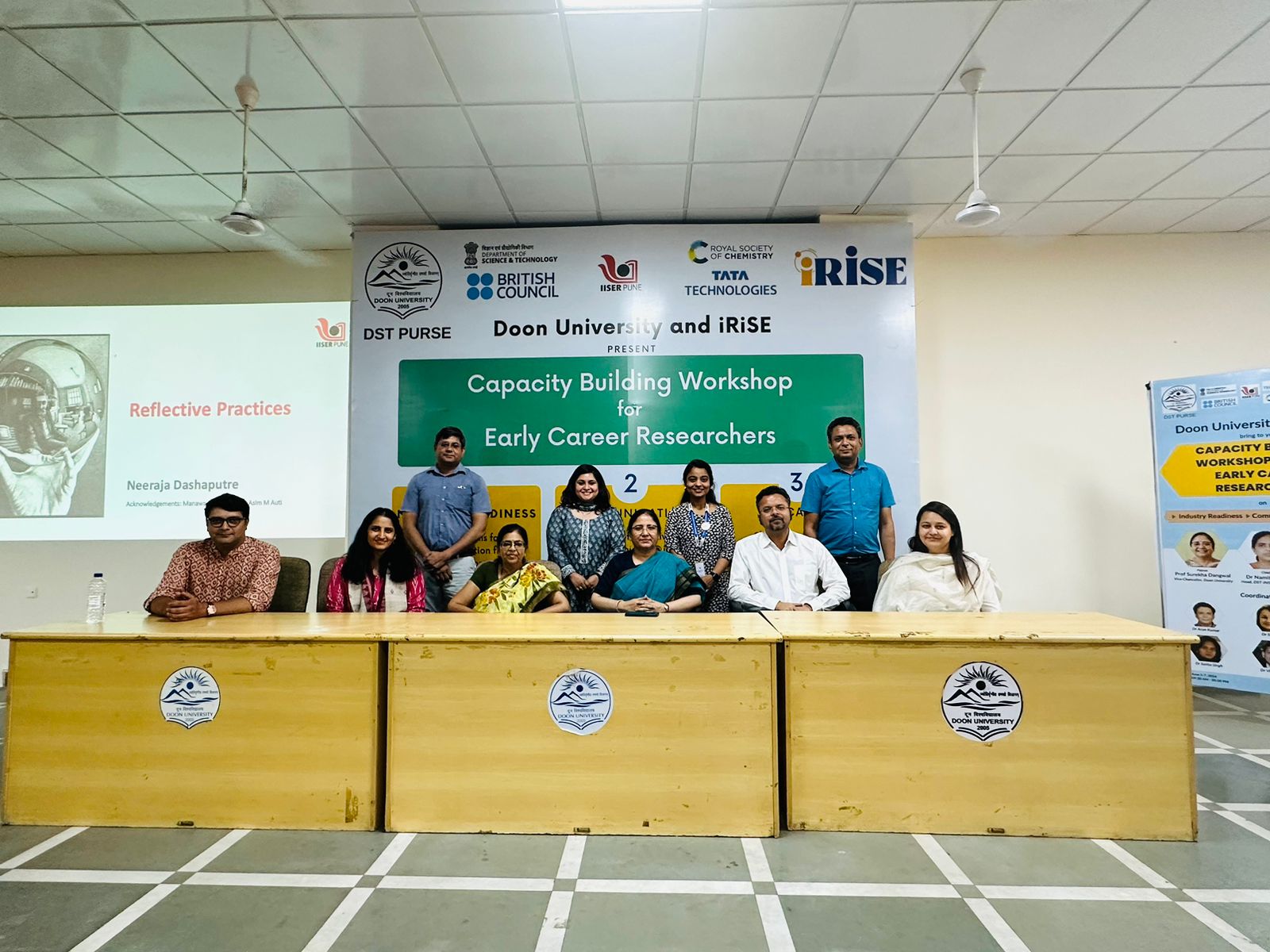
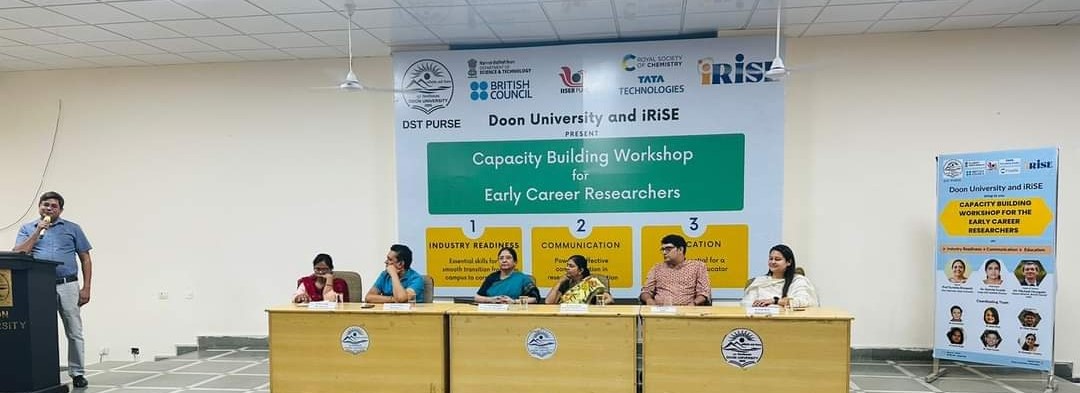
5th June 2024 to 7th June 2024:
Capacity Building Workshop for Early Career Researchers in collaboration with iRISE, a Collaborative Programme between the Department of Science & Technology (DST), British Council, Royal Society of Chemistry (RSC) London, and Tata Technologies
Doon University organized 03-day joint workshop in collaboration with iRISE (Inspiring India in Research Innovation and STEM Education) during 5th June 2024-07th June 2024. iRISE is a collaborative programme between the Department of Science & Technology (DST), British Council, Royal Society of Chemistry (RSC) London, Tata Technologies & TATA Trust. The workshop was coordinated by Dr. Swati Bisht, Dr. Arun Kumar, Dr. Vikas Sharma, Dr. Vipin Kumar, Dr. Sarita Singh, and Dr. Romilla Chandra. It was attended by 88 doctoral and post-doctoral scholars from leading Government and Private Institutions of the country like IIT Roorkee, IIP, Wadia Institute of Himalayan Geology, CSIR, CBRI, Delhi University, Central University of Rajasthan, Central University of Haryana, GB Pant University, HNB Garhwal University, Kumaon University, Uttarakhand Open University, DIT University, and UPES.
The Early Career Researchers (ECR) Strand of iRISE is an immersive programme to empower early career researchers (PhD scholars) to work with industry and create an intense pipeline for R&D engagements in the country. The programme, held in offline mode, aimed at buildiing 21st-century skills (such as leadership, collaboration, management, communication, diversity and inclusion, resilience, entrepreneurship, and innovation skills) for STEM PhD scholars.
In our rapidly evolving global economy, the scientific workforce is going to have an increasing influence over industries, economies, and societies. Early Career Researchers (ECRs), encompassing Ph.D. graduates and post-doctoral academics, are expected to possess specialized skill sets crucial for leading the 21st century. These skills mainly include critical thinking, problem-solving, and domain expertise. However, a prevalent concern is the disparity between their profound domain knowledge and their practical skills sought after by employers across industry, governance, and academia. Recognising this disparity, there is a pressing need to develop a comprehensive up-skilling program tailored to equip these individuals with the practical skills demanded by employers in diverse professional settings.
On Day 3, Dr Namita Gupta, Advisor to Government of India for Science & Technology and Head, DST-INSPIRE Division of Department of Science & Technology, was the Chief Guest. According to Dr. Namita Gupta, the time has come when industry, academia and scholars should function collaboratively in a diverse ecosystem. According to Vice Chancellor Prof Surekha Dangwal, such workshops are the need of the hour for the research scholars of today to make their tomorrow better. Doon University shall continue to organise such meaningful programmes to excite the students for better results. Through these 3 days there were sessions on Industry readiness, communication and 21st century skills.
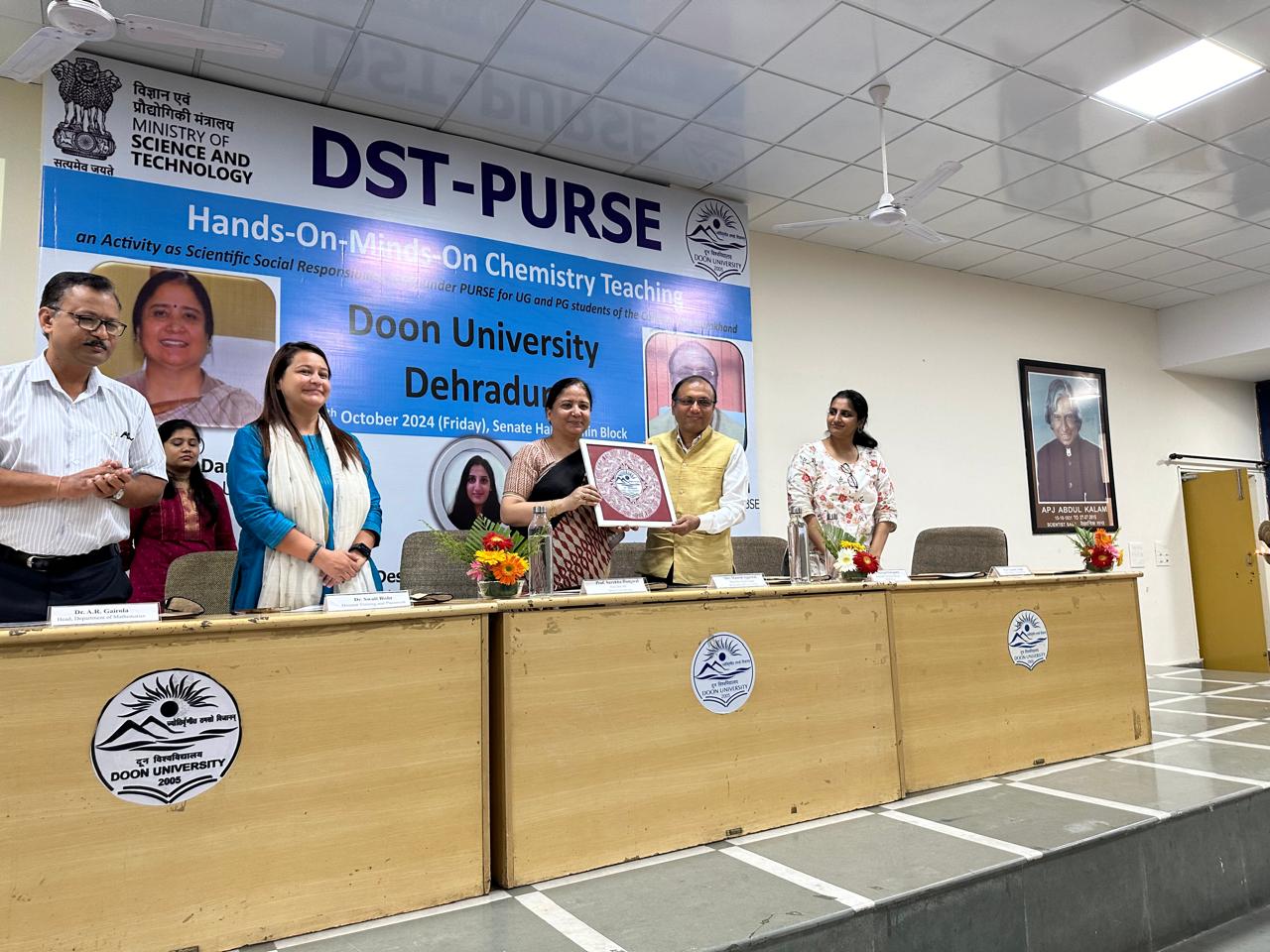
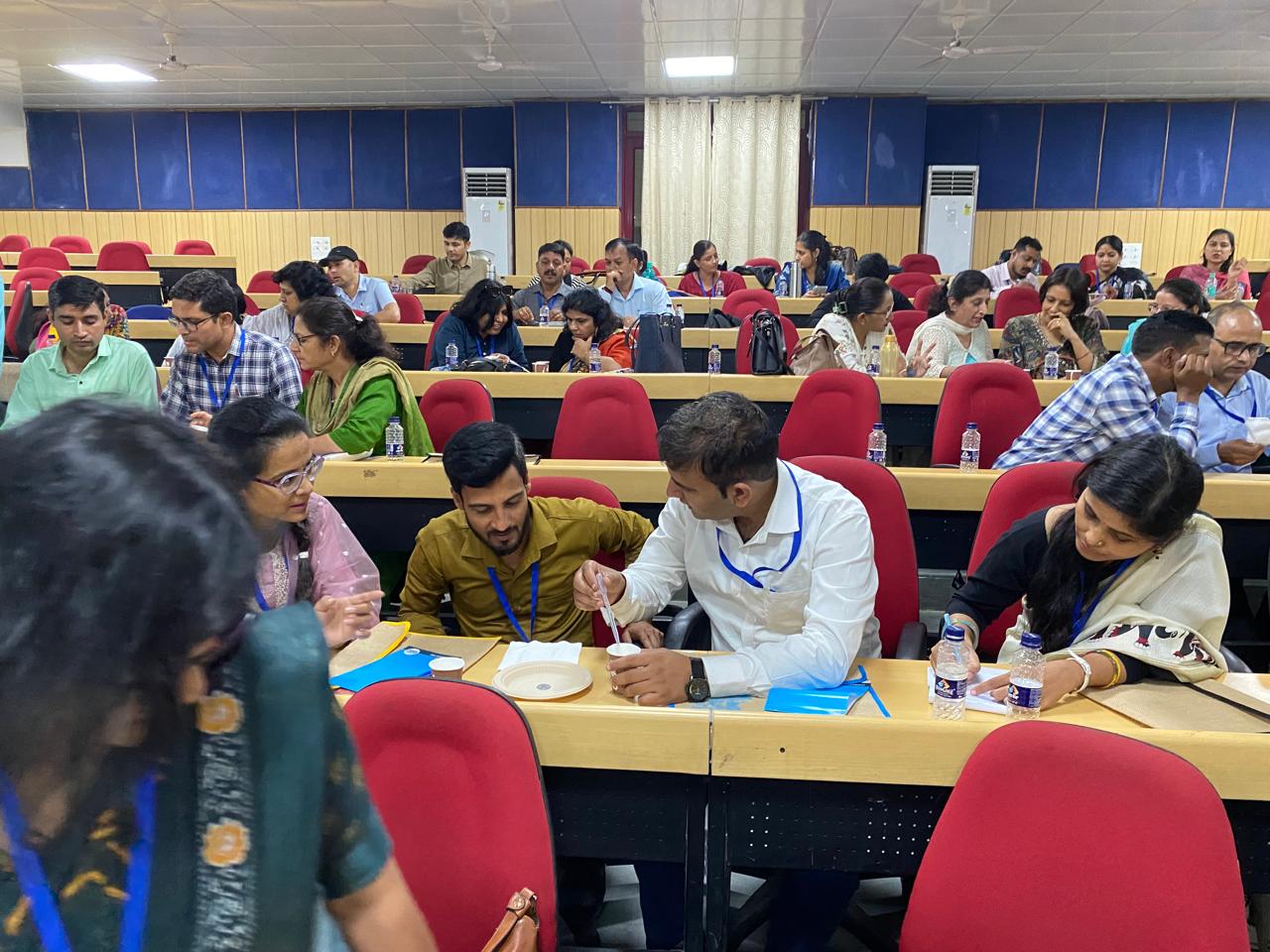
It is an important initiative taken by Doon University under the aegis of DST PURSE. University organized a one-day workshop on "Hands-on Minds on Chemistry Teaching" as the Scientific Social Responsibility (SSR) for chemistry teachers of the Schools of Uttarakhand on 4th October 2024 under the aegis of PURSE Scheme of the Department of Science and Technology (DST), Ministry of Science and Technology. Dr. Arun Kumar, Dr. Charu Dwivedi, Dr. Himani Sharma, Dr. Dr. Vikas Sharma, Dr. Asha Ram Gairola, Dr. Sarita, Dr. Komal, Dr. Shivani Verma and Dr. Khushboo were involved in organizing the program. This workshop was also supported by Royal Society of Chemistry (RSC) London. A large number of chemistry teachers of the Schools of Uttarakhand participated in the workshop. During the Inauguration, the regional officer of CBSE Shri Manish Agarwal was the Chief Guest. Vice Chancellor of Doon University Prof. Surekha Dangwal presided over the ceremony. Dr. Neeraja Deshaputre, Principal Technical Officer at Indian Institute of Science Education and Research (IISER) Pune was the trainer and resource person.
The inaugural session of the workshop was also attended by Prof. Gajendra Singh (Head, School of Management) and Dr. Swati Bisht (Director, Placement & Training Cell).
PURSE (Promotion of University Research & Scientific Excellence) is a flagship programme of the Department of Science and Technology (DST), Ministry of Science and Technology, Government of India. She mentioned that PURSE was launched by the DST in the same year 2009 when Doon University launched its first academic session. PURSE is exclusively for the University sector of the country. Till 4th October 2024, it is the only Doon University in the State of Uttarakhand which has been recognized and selected by the DST for support under PURSE. There are nearly 60 Universities across the nation which have been selected by the DST for support under purse during the last 15 years. The main objective of the scheme is to strengthen the research capacity of performing Indian Universities and provide support for nurturing the research ecosystem and strengthening the R&D base of the Universities in the country. Under PURSE, Doon University is working to carry out Mission mode research activities to focus on the thrust area (i.e., clean energy) of National priorities.
Shri Manish Agarwal Ji (Regional Officer of CBSE) supported the workshop by circulating the information about the workshop among many of the schools of Uttarakhand and Western Uttar Pradesh. According to him, such workshops are very much beneficial for the school teachers. Such workshops provide the platform for establishing the connect between the higher education institutions/ universities and the school teachers. He appreciated Doon University for such an initiative and connecting the schools of Uttarakhand.
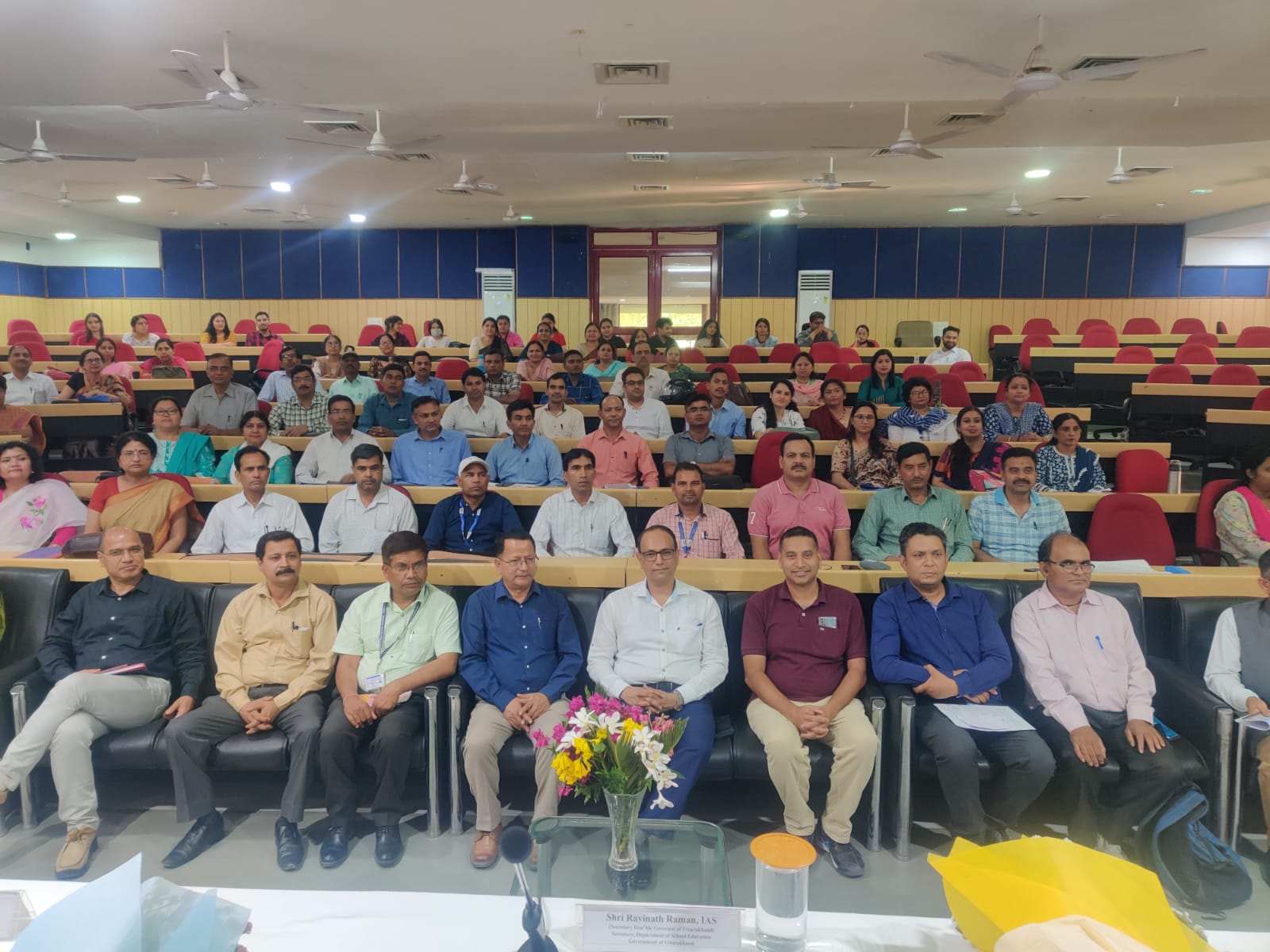
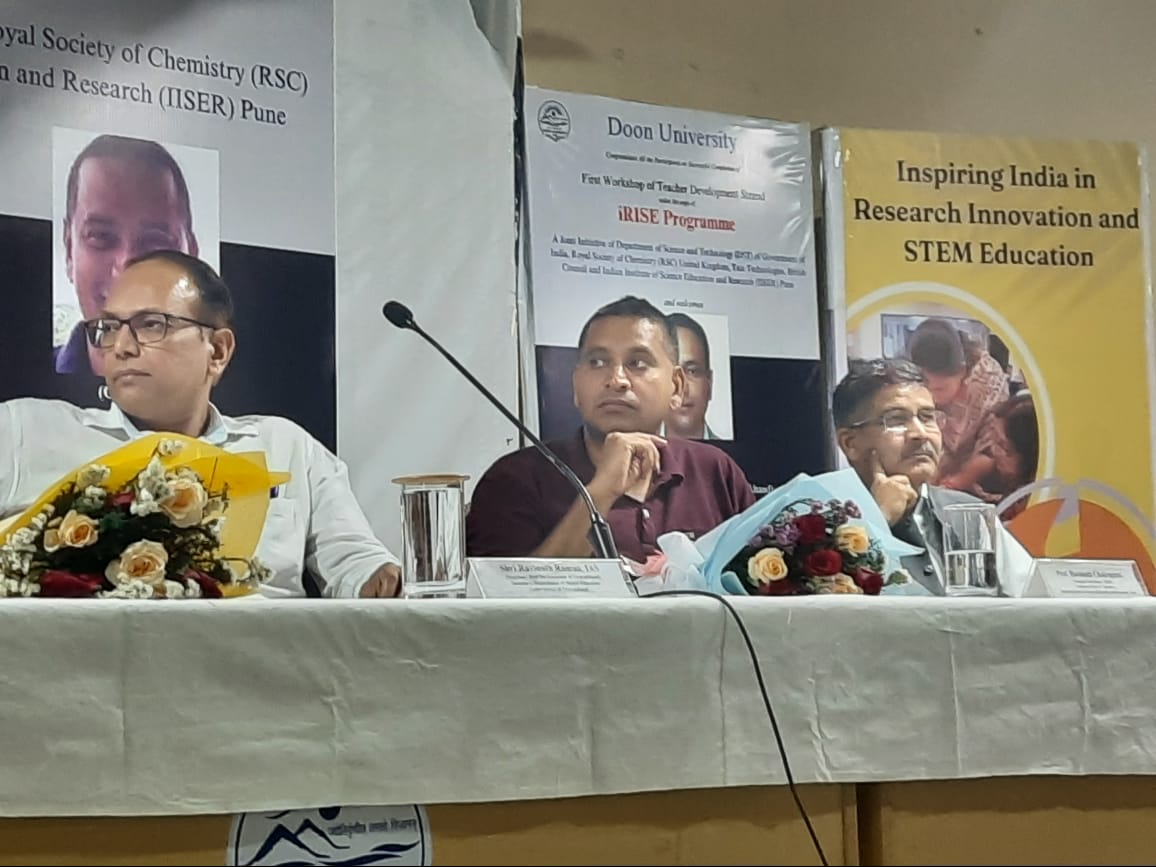
The University hosted a highly ambitious iRISE Program at Doon University. It was a state level 03-days residential training for the School teachers of Uttarakhand under the aegis of iRISE (Inspiring India in Research Innovation in STEM Education). Indian Institute of Science and Education Research (IISER) Pune is the national level coordinator of iRISE program. This training was completed successfully today on 12th May 2023 (Friday) when 75 teachers of Dehradun and Haridwar districts accomplished the training. In the valedictory ceremony, Shri Ravinath Raman (Secretary of Department of School Education in Government of Uttarakhand) was the Chief Guest. Prof. Harinath Chakrapnai, the national coordinator of the i-RISE program, was also present.
iRISE program is the joint initiative of Department of Science and Technology (Ministry of Science and Technology, Government of India), the Royal Society of Chemistry, the British Council, and Tata Technologies. This workshop, conducted in Doon University by IISER Pune in collaboration with State Council of Educational Research and Training (SCERT) Uttarakhand for the science and mathematics teachers of the state, may pave the way of development and transformation of the teachers in adopting new, innovative and activity-based methodologies of teaching. Such methodologies may help the teachers to inculcate interest among the students in mathematics and science. Uttarakhand is the third state after Maharashtra and Bihar where this program has been launched. The workshop was widely covered in the main stream media.
Under the aegis of iRISE, a total of 500 teachers have been trained in Uttarakhand in the first phase. Thereafter, some of the teachers (trained in the first phase) will be selected for second phase on the basis of their activities in the classroom. Under the second phase, selected teachers may receive 10-day residential training at the Indian Institute of Science and Education Research, Pune or at Doon University. Teachers who receive 10 days training will be known as Innovation Champions. In the third phase, all the Innovation Champions will organize cascade workshop in their respective district with the help of I-RISE. Under this program, a kit will also be made available to all the schools which will prove to be very helpful for the teachers to conduct the activity-based learning sessions in the schools. iRISE program has four strands and one of them is the Teacher Development Strand, under which this workshop was organized to train the teachers. This project is being funded mainly by the Department of Science and Technology (Ministry of Science and Technology, Government of India), the Royal Society of Chemistry, the British Council, and Tata Technologies. The iRISE program has different phases. The objective of this program is to enhance innovation and creativity among teachers and students. The objective of this program is to get more and more nominations of the students of the state in the Inspire Awards – Manak, which is a scheme of the Department of Science and Technology, Government of India, to encourage the children of the country to innovate. In training, priority has been given to the tendency to understand instead of rote learning. The teachers learnt how to teach science and mathematics to the young students by connecting them with the surrounding environment and giving examples of daily life incidents. Teachers also acquired innovative approaches to make inquiry and activity-based methods of teaching-learning in the interdisciplinary fields of science and mathematics. For this three-day programme, separate sessions will be conducted on Science and Mathematics by Prof. Harinath Chakrapani, Shraddha Bhurkunde, Mohd. Taqi, Zahida Shaikh, Harsha Kulkarni and Sanket Raut from Pune.
State Coordinator of Inspire Award Uttarakhand Dr. Avneesh Uniyal, Deputy Director of SCERT Uttarakhand Kiran Bahukhandi, and Dr. Umesh Chamola were also present on this occasion. Prof. R.P. Mamgain, Prof. H.C. Purohit, Dr. Arun Kumar, Dr. Charu Dwivedi, Dr. Preeti Mishra, Dr. Rajesh Bhat, Dr. Vipin Kumar, Dr. Anuj Kumar and Mr. Suraj Purohit were present from Doon University.
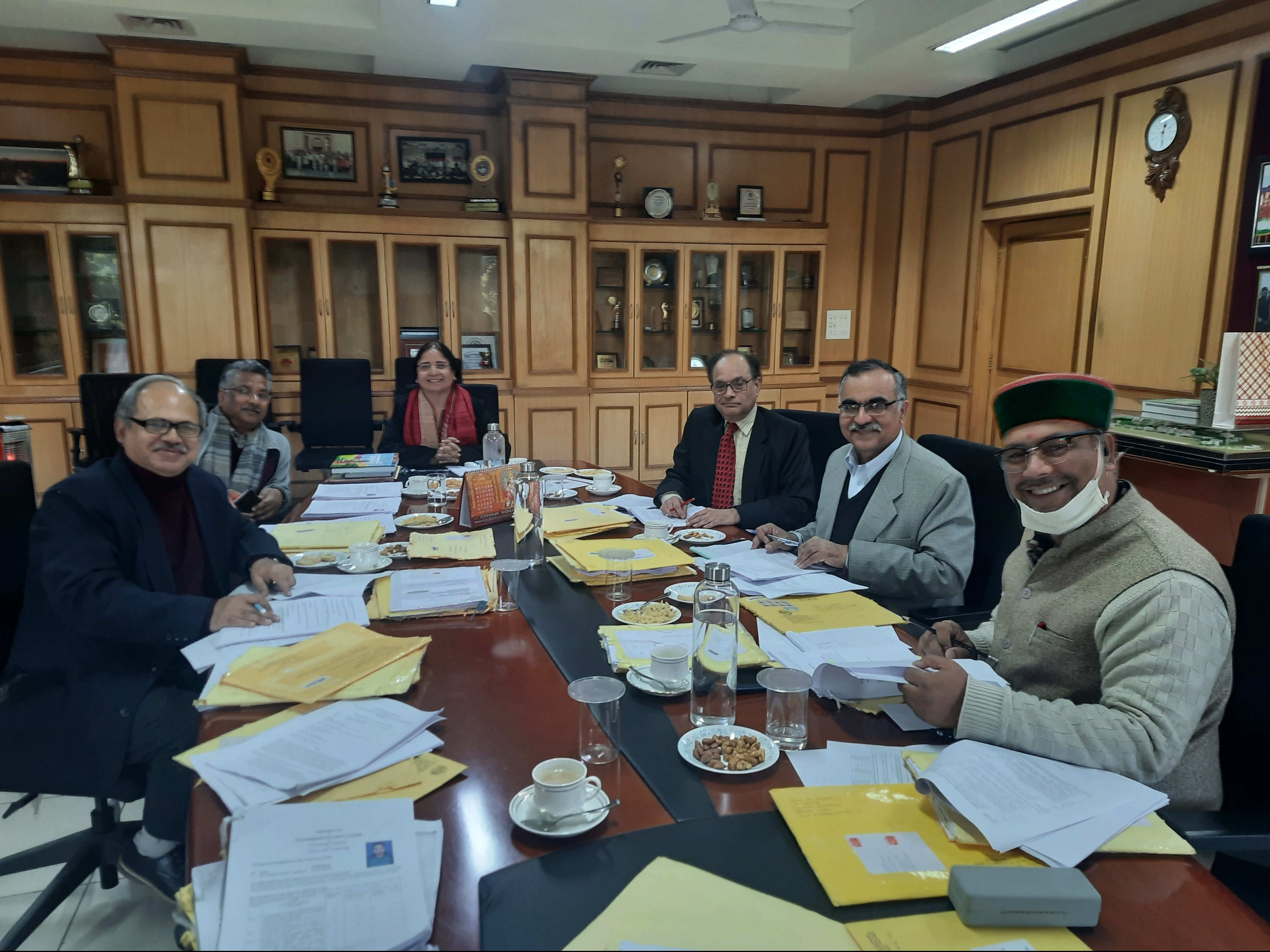
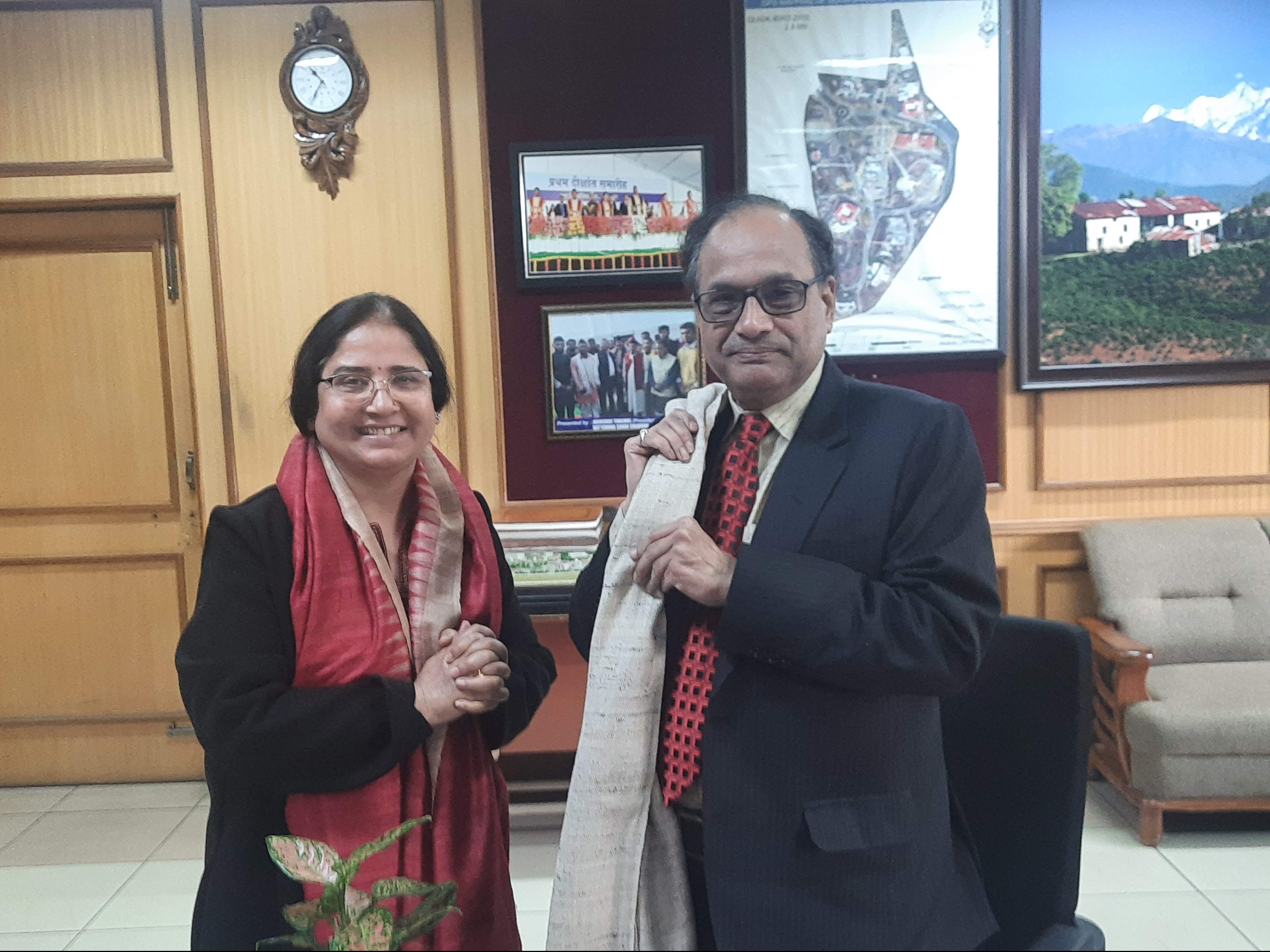
On behalf of Hon'ble Vice Chancellor Doon University, Research & Development Cell of Doon University acted as the nodal centre. It invited the applications for Governor's Best Research Award(s) for the year 2021-2022 in the fields of Science & Technology (S&T), Himanities & Social Sciences, and Performing Arts & Folk Theatre. Research & Development Cell made the assessment of all the applications through a highly empowered and credible committee, chaired by Prof. K.K. Pant (Director, Indian Institute of Technology Roorkee).
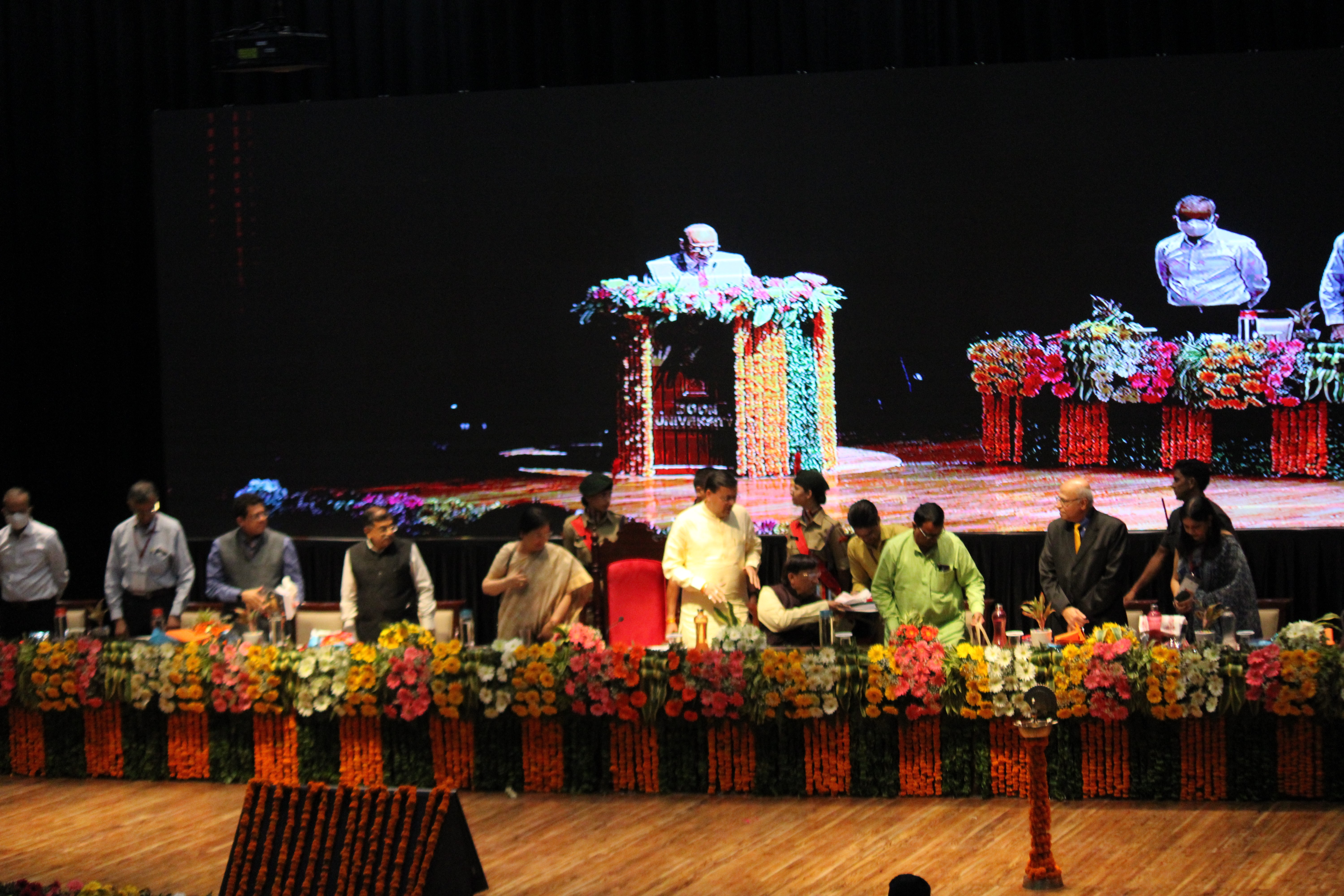
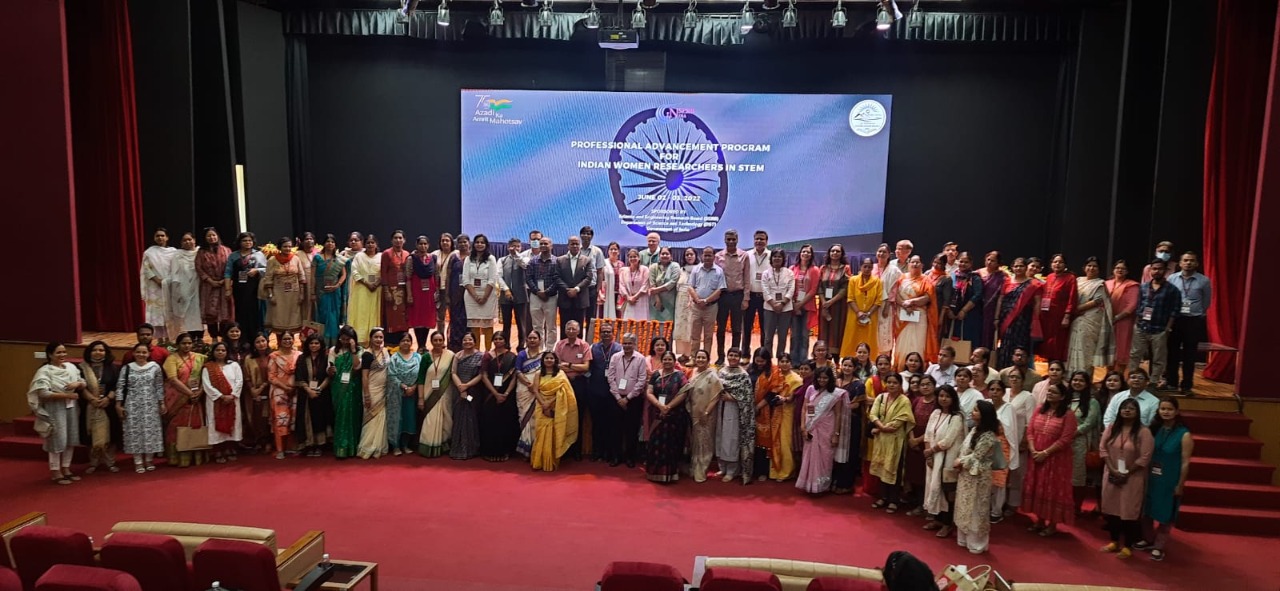
A two-days Professional Advancement Program for Indian Women Researchers in STEM, sponsored by Science and Engineering Research Board (SERB), Department of Science and Technology, Government of India was organized at Doon University Dehradun (Uttarakhand) during 02nd-03rd June 2022. Enhancing the skills and competence of women scientists and academicians (engaged in research and development activities) was the main purpose of the program. Additional objectives were to sensitize, inspire and orient the women researchers in STEM for translational research and enable them to acquire competence for ensuring equal access and weighted opportunities in government funding schemes and their scientific growth. About 500 participants including, POWER (Promoting Opportunities For Women in Exploratory Research) grantee, women researchers and young faculty members from various states of the country attended the program. Some researchers from high hills of Uttarakhand also participated.
The workshop provided a platform to women researchers to interact with each other and catalyzed the collaboration among them in interdisciplinary areas. The program had highly relevant and significant interactive sessions on the following topics with eminent scientists:
The event was started with inauguration session graced by Hon’ble Chief Minister Shri Pushkar Singh Dhami, Government of Uttarakhand. He appreciated the efforts of SERB to mitigate the gender disparity in STEM. He also highlighted the role of Uttarakhand’s women in the research and related areas.
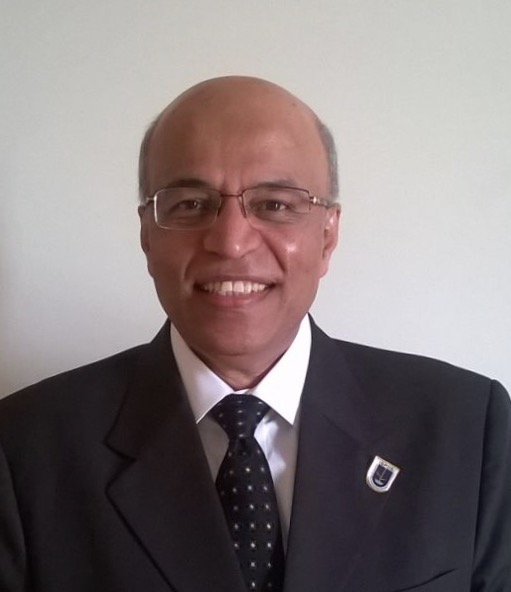
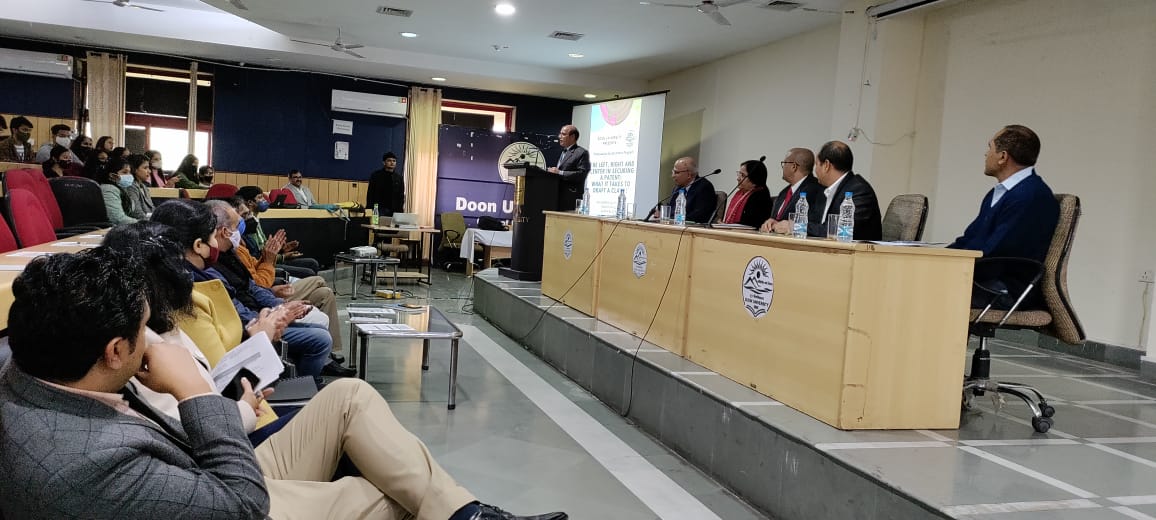
Doon University organized the first workshop on IPR entitled “The Left, Right and Center in Securing a Patent: What it takes to draft a Claim” in collaboration with Banakar Consulting Services, Westfield, IN 46074 USA. The resource person in the workshop was Prof. Umesh V. Banakar, a Professor and an Independent Consultant/Advisor to Pharmaceutical Industry and Academia worldwide with extensive contribution in drug product development and evaluation (in vitro and clinical). During his academic career, he has served as Professor of Pharmaceutics, Director of Research, Chairperson of Department of Pharmaceutical Sciences and Head/Dean of Graduate School at 3 Universities in the US. He assists/directs research teams in structuring and successfully prosecuting patents. Additionally, he directs scientists and management in analyzing IP for non/infringement, in/validity analyses. Furthermore, he has served as testifying/non-testifying expert in over 65 patent litigations in the disciplines of pharmaceutical formulations/technology, clinical investigations and dissolution testing.
He is the Founder of Goa – Center for Excellence in Intellectual Property [G-CEIP] – non-profit, personally funded Center to promote IP Awareness nationwide. Additionally, he is the founding Board Member and Principal Scientific Adviser of Society for Pharmaceutical Dissolution Science [SPDS]. Furthermore, he is the Founding Chairperson of 2 International CROs and has executed over 800 clinical trials (Phase I-IV including BE studies). He is the founding Board Member and Principal Scientific Adviser of Society for Pharmaceutical Dissolution Science [SPDS].
He is on the International Scientific Advisory Board of several pharmaceutical corporations worldwide. He has authored over 300 publications in various formats (textbooks, chapters in textbooks, manuals, research articles, expert book reviews, guest editorials, among others) and serves on International Editorial Advisory Boards of various publishing houses and scientific journals. He is on the roster of experts with WHO and United Nations (UN) programs. He is listed in Who’s Who in Biotechnology, Who’s Who Among Asian Americans, and American Men and Women of Science. He has received numerous awards for excellence in teaching, research/scholarly activity, two Service to Country Awards from the UN and nomination for the distinguished Fulbright Scholar Award for Teaching.
A patent is an official document granting a right or privilege to an inventor for a term of years the only right to make, use or sell his or her invention. It is crucial that the scientists – generators of IP – understand the fundamentals as well as the nuances of the techno-legal considerations associated with assessing and translating their research findings into intellectual property worth protecting by securing a ‘patent’. The process of patenting an invention starts with structuring an application which moves through a fairly well-established process incorporating several linear steps which ultimately culminate into securing an allowance of a claim(s). A well drafted application often decides the fate of an invention. As a result, drafting plays a crucial role in the success of an invention during its prosecution through securing the grant of a claim(s). In so doing drafting a patent application more than often poses to be a daunting task. It is well known that most researchers, eventually inventors, enjoy challenges, and ensuring that t a good patent is successfully secured can be a real challenge. In general, researchers turned inventors lack formal training in writing and/or the training is limited to practical/scientific paper or report writing. A judicious combination of several areas of expertise including, but not limited to, logical thinking, writing, technical knowledge and, of course, legal knowledge are essential. More than often this proves more challenging than expected.
This 2-day intensive focus program provided the basic principles in translating research investigation into an invention leading to securing a Patent. This program was centered around core topics such as Prior Art: search and analyses; principles of Anticipation and (non)obviousness); demonstrating difference between novelty and innovation; explaining inherency; understanding of (non)enablement and (non)indefiniteness; among others. Additionally, extensive discussion was focused on specific considerations associated with Claim: language, element(s), preamble, body, connecting phrases, scope, limit, drafting of the claim language (text), among others. The presentation, in addition to being interactive, was generously supported with actual case studies which were appreciated and understood by the participants (i.e., researcher/scientist) who may be the future IP generators. There were 04 sessions in the workshop. The details are as follows:
DAY 1: Session I:
In this session, Dr. Banakar discussed objectives and outcomes. He also clarified the understanding of Patent Process in brief in context of Application – Prosecution – Allowance. In this session, he also highlighted how “Patentability is an afterthought”. This session also had a discussion on Translating/Articulating Research into Invention (Scientist’s perspective).
Day 1: Session II:
In this session, Professor Banakar explained the concept of Prior Art/Information Disclosure Statement. The first part of this topic was Search and Identification. The second part was Analyses and Demonstrating Differentiation. In this session, basics of patentability were also explained. He explained in detail how Research Findings can be articulated into Patent Claim. He also highlighted this in terms of Invention to Practice.
DAY 2: Session III:
On the second day of the workshop, Prof. Banakar demonstrated the difference between Novelty and Innovation, principles of Anticipation and (non)Obviousness, and concept of Inherency. In this session, he also helped the participants to gain understanding into the concepts of (non)Enablement and (non)Indefiniteness. This session also included the discussion on Secondary Considerations such as Failure of others, Long felt need, and Others
Day 2: Session IV:
The 4th session of the workshop was held on the second day of the workshop. In this session, Prof. Banakar discussed how to construct Patent Claim. He trained the participants on Claim Language, Element(s) of a claim, Preamble and Body of the claim, and Connecting phrases and notations. He also explained the Scope and Limit, Consisting versus Comprising, Markush Group, Drafting of the claim language (text) and other related issues. He also thrown light on Understanding Markman Hearing – Researcher/Scientist Perspective, Resolving Claim Construction Disagreements, Understanding of Validity and Invalidity of Patent [Claim(s)] with Case Studies, and Understanding of Infringement and Non-infringement of Claim(s) with Case Studies. In the last part of this session, Prof. Banakar presented the Summary and made Concluding Remarks.
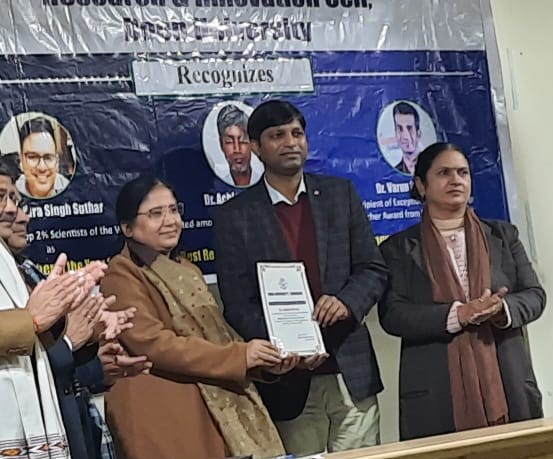
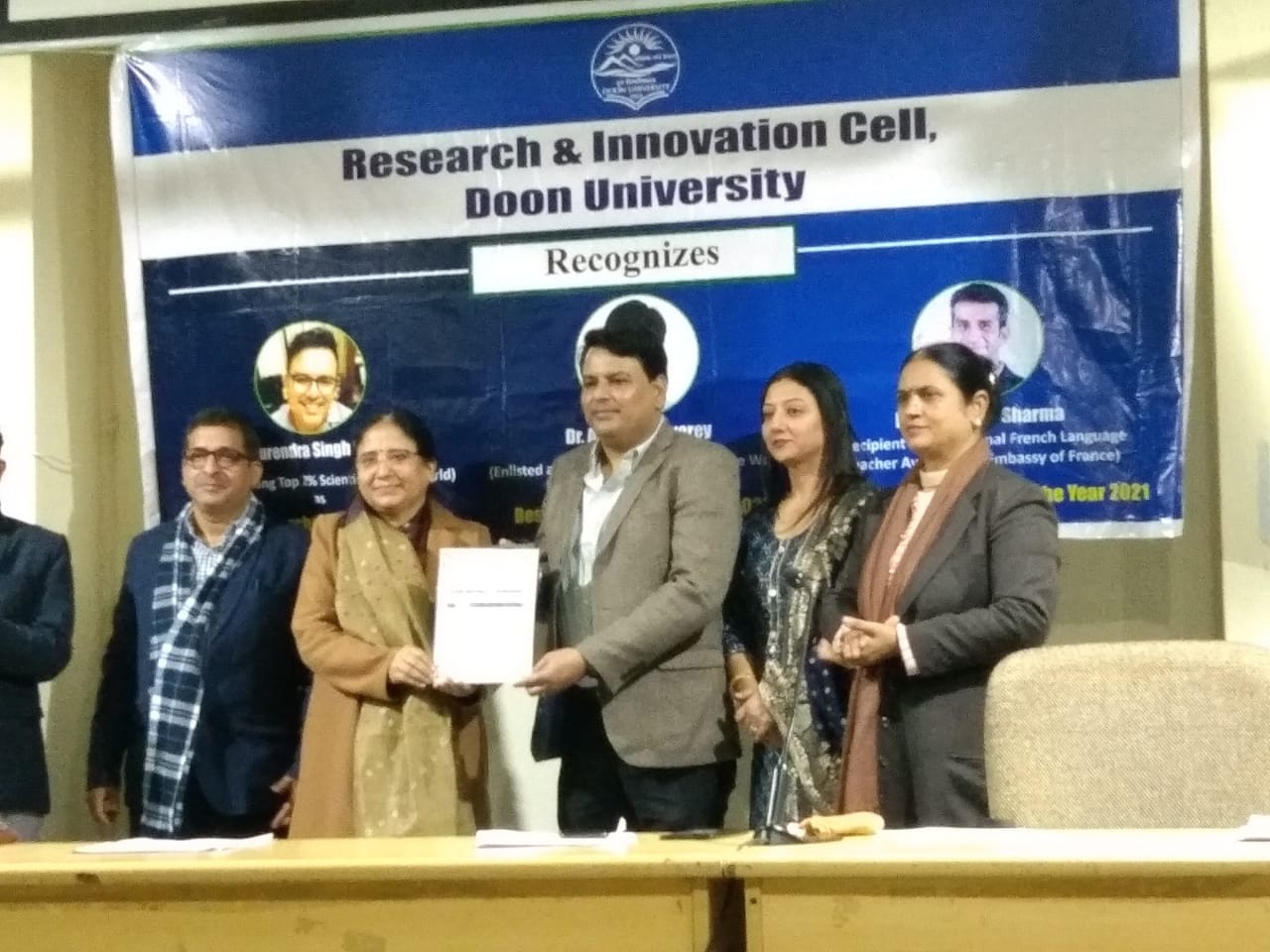
Research Cell of Doon University organized a program on 23rd December 2021 to recognize Dr. S.S. Suthar as the Best Researcher of the Year 2020, and Dr. Achlesh Daverey as the Best Researcher of the Year 2021. In the same program, Dr. Varun Dev (Faculty Member in the Department of French and Francophone Studies) was recognized as the Best Teacher of the Year 2020.